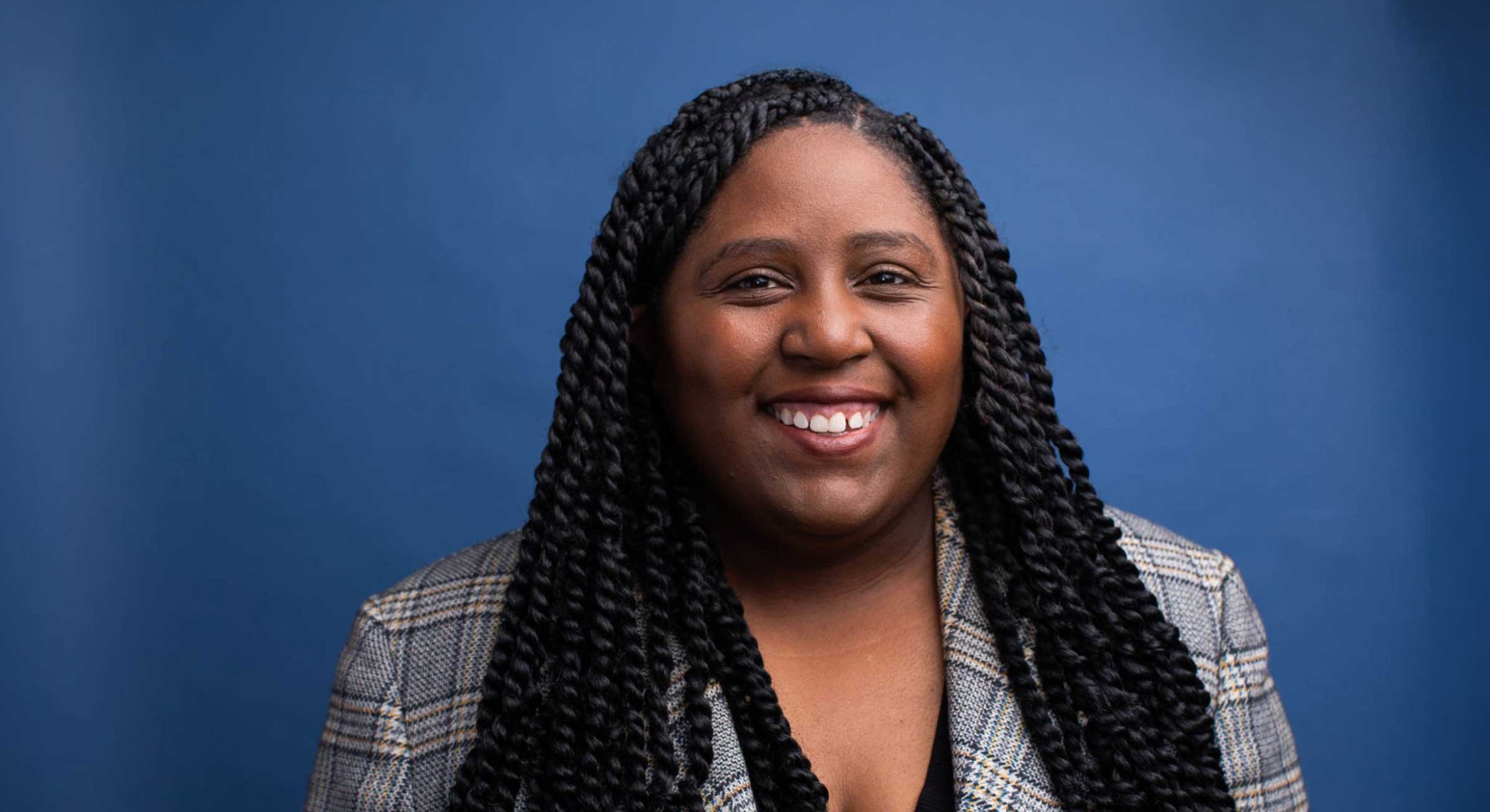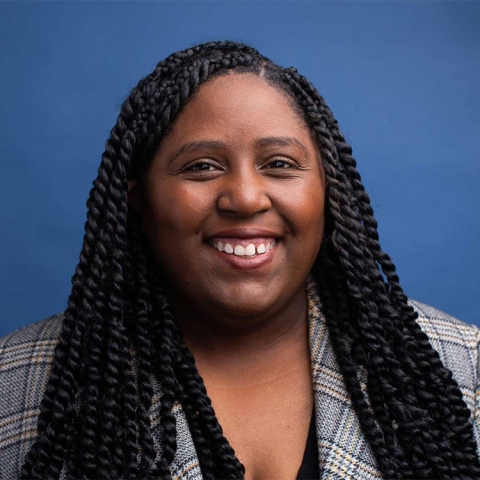
The roots of African American English date to the original Thirteen Colonies established in the 17th century, and have since grown to shape language across the United States. Yet, outside a few fields of specialized study, relatively little information about the linguistic practices of Black Americans has made its way into institutes of higher education.
That’s beginning to change, thanks to scholars like Michelle Petty Grue.
An assistant teaching professor in the Writing Program and the College of Creative Studies at UC Santa Barbara, Petty co-authored a new paper that amplifies a longstanding call for educational justice and the preservation of cultural and linguistic identity in college classrooms.
“Black Linguistic Justice from Theory to Practice,” published last summer in College Composition and Communication, has won the 2025 Conference on College Composition and Communication (CCCC) Braddock Award for outstanding article on writing or the teaching of writing.
“The article is deeply embedded in disciplinary knowledge while also offering something new, specific and vitally important,” the award committee noted. “It is theoretically sophisticated, empirically grounded and eminently practical. (The authors’) work models how writing instructors can live out their commitment to helping students make informed choices in their writing, how writing researchers can meaningfully collaborate with a range of constituents, and how researchers can keep the student populations they hope to benefit at the heart of their work by including them as co-researchers.”

The paper also introduces the Students’ Right to Their Own Language website (SRTOW.org), which emerged from co-author Anne Charity Hudley’s “efforts to ensure that Black students would have resources they could use to advocate for themselves, but also so that writing instructors would have readily accessible tools for working against white language supremacy in their own classrooms,” Petty said.
Now the Bonnie Tenenbaum Katz Endowed Professor of Education at Stanford University, Charity Hudley is the former North Hall Endowed Chair in Linguistics of African America at UCSB.
Ahead of the award presentation, held this year on April 11 in Baltimore, The Current caught up with Petty to learn more.
You grew up in your mother’s native England, reading and writing as part of everyday life, but also with your father’s storytelling traditions anchored in Black America. Today, as a teacher of writing, how does that blended language background inform your work?
In a few different ways. Primarily, it undergirds the academic arguments that students come with funds of knowledge equally valuable to the writing process as anything they will learn in the classroom. Even without those arguments, though, I knew from what my father exposed me to that there was nothing about the Brothers Grimm that made them superior to Anansi stories out of West Africa. I knew that the oratory style of Black public speakers, from Martin Luther King Jr to Barack Obama, was in no way inferior to white oratory.
Pairing this home knowledge to what I learned in graduate school gives me motivation and academically recognized evidence to provide opportunities for students to write in their own language.
What’s the strongest case that African American English (AAE) should be portrayed as an academic language variety?
I’m going to push against this question. Why should “Standard” — read white — American English be considered the default academic language variety? Why has it been? It is simply that, before the Civil War and the advent of historically Black colleges and universities, the American academic project was made by and for white men. Neither women nor people of color and their ways of thinking, speaking or writing were considered because they were forcibly excluded from that academic project and its manner of doing language.
The original ‘Students Right to Their Own Language’ statement was presented at CCCC in 1974. Our article was published exactly 50 years after that statement was issued. I think the long history of resistance against using AAE in academia tells its own story, especially in the face of the reasonable logic that, of course, academic work is produced in languages besides English.
So it’s accurate to say that many students have been discouraged from writing, from creative expression, because their AAE voices were not validated in academic settings.
It is not simply that AAE has not been validated in academic settings. It is that, via the unfortunate reality of white language supremacy, AAE has been positioned as wrong, as inferior, as “okay at home but not in school.” It has also been used to segregate Black students out of the classrooms they’d finally been allowed to integrate by classifying their language as so inferior that they needed to be in “special education” at vastly disproportionate rates compared to white children. Beyond that, the African American rhetorics that testify, that play the dozens, that speak truth to power, have been criminalized within our educational system, adding to the many ways in which African American children are pushed out of the classroom and into the criminal justice system.
In that educational environment, one in which Black language is only considered good during Black History Month, and then only the chosen few — MLK, Langston Hughes, sometimes even Toni Morrison — it is hardly surprising that Black students feel some kind of way about the English or writing classroom.
The paper states that Black linguistic justice has yet to fully arrive in the curriculum and teaching practices of higher education. For this arrival to truly happen, Black college students must be part of this conversation. What was the importance of student researchers in the context of this paper, and moving forward?
When we consider advocacy work, it is essentially infantilizing at best, dehumanizing at worst, to assume that we could come to any sort of practice that betters the lives of those we are concerned with, yet not consult those very same people. I say dehumanizing because the only context in which this makes sense is advocating for animals and the environment. They cannot speak for themselves. To treat a human group likewise is to enact white language supremacy yet again, because it requires an assumption that this group cannot adequately speak for themselves.
Given the undeniable dehumanizing history of African Americans — beginning in chattel enslavement up through the recent attempts to deny birthright citizenship, which was originally designed to grant the formerly enslaved the right to be considered fully human and fully American — you can see why we, as Black scholars and their allies, felt the need to position Black college students at the center of our work. They were the ones living the experience in our contemporary moment and needed only the opportunity to speak for themselves about what they needed. My colleagues and I feel strongly that the website and this publication were so powerful because we listened to Black students.
The website (SRTOW.org) encourages students to be their own advocates, to be upfront with their writing instructors about what’s expected in an assignment and with respect to how they prefer to express themselves. Is this happening to a greater degree or are most students too shy and busy to make that extra effort? What can teachers do to further open those lines of communication?
Great questions. We would need to do a whole new research project to answer the question of whether students are advocating for themselves to a greater degree. But certainly we hope so.
To your second question, I think sharing this resource with students is vitally important. Also, reframing office hours as student hours — during which teachers not only welcome students but anticipate their arrival — is key to providing students the space to communicate with professors.
For me personally, I try to actually give feedback online and in person with students, rather than imposing my writing all over their papers. It allows students to join me in conversation about their work, rather than positioning me as the judge of their writing.
Is there anything you’d like to add?
It has been an honor to be part of this project. As someone who spent decades taking on the white language practices necessary for success in academia, particularly in my discipline, I am grateful to do my small part to help Black students be unapologetically Black in English and writing classrooms.




